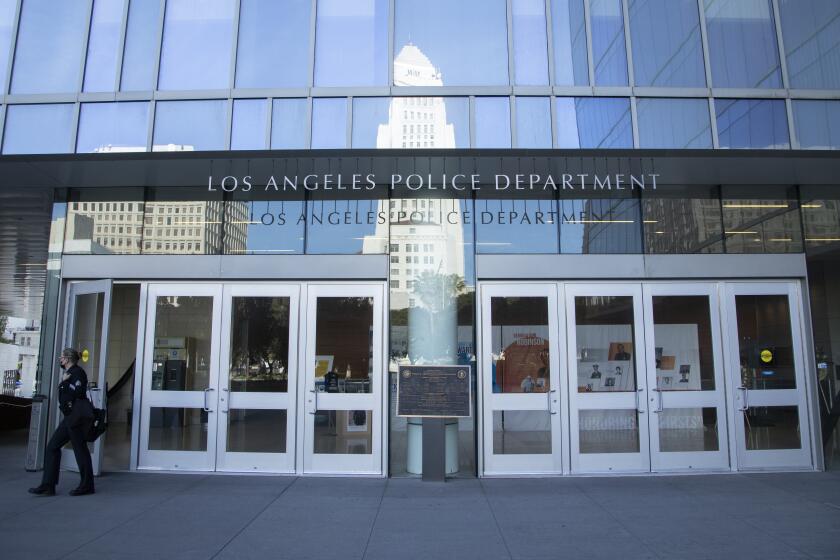Riordan Clout Helped Charter Measure
Relying on his weighty political influence and even heftier campaign war chest, Mayor Richard Riordan received strong support for a sweeping charter reform measure Tuesday, but did not succeed in electing most of his hand-picked candidates to the panel charged with rewriting the document.
By a 6-4 margin, the electorate supported Proposition 8, a Riordan-backed measure that asked voters to create an elected citizens panel to revise the 72-year-old charter that acts as the city’s constitution.
The same measure asked voters to elect the 15 panel members--one from each council district--to work without pay for nearly two years on the reform effort.
Despite spending nearly $300,000 on a slate of candidates, Riordan only succeeded in getting three of the 12 people he endorsed elected. Two of those winners were also endorsed by labor unions. Three other Riordan candidates were forced into June runoffs.
In fact, none of the slates endorsed by Riordan, the City Council, community groups or labor unions dominated the charter race. The election winners and the runoff candidates represent a hodgepodge of interests and backgrounds.
Still, the Los Angeles County Federation of Labor and the Service Employees International Union Local 347 expressed satisfaction Wednesday that seven candidates endorsed by labor were elected Tuesday, though the unions expended only half of what Riordan spent on the race. Two of those candidates were also endorsed by Riordan and City Council members.
Julie Butcher, acting manager of Local 347, said labor candidates “prevailed, in part, because labor unions and their members are active participants in their communities.”
But several candidates and Riordan’s associates played down the endorsements, saying the reform panelists will work independently regardless of who backed them.
“We have a common interest,” said Jimmie Woods-Gray, a teacher who faces a runoff in the Westside’s 6th Council District. “While there may be some areas of difference, there will be some where we can all agree.”
While Riordan plans to continue supporting his three candidates in the June runoff, Mike Keeley, a longtime Riordan associate who provided legal advice to the reform campaign, minimized the role of the endorsements.
“Labor is dancing in the streets as if they can breathe easy now,” he said. “But all of the people elected should be highly independent.”
The eight candidates who won are:
* District 1, Gloria Romero, a professor and college trustee, endorsed by Riordan and the labor unions.
* District 2, Anne Finn, community activist endorsed by labor.
* District 3, Dennis Zine, a police sergeant and union representative endorsed by labor.
* District 5, Erwin Chemerinsky, USC law professor endorsed by labor.
* District 7, Marcos Castaneda, a City Council aide endorsed by Riordan and labor.
* District 8, Marguerite Archie-Hudson, a former assemblywoman endorsed by labor.
* District 10, Jackie Dupont-Walker, a community developer endorsed by labor.
* District 12, Paula Boland, a former assemblywoman endorsed by Riordan.
Fourteen other candidates face a June runoff for the seven other seats. They are Bill Weinberger and Charley Mims in the 4th District; Chester Widom and Jimmie Woods-Gray in the 6th District; Ricardo Torres II and Woody Fleming in the 9th District; Lorri Jean and Bennett Kayser in the 13th District; Nick Pacheco and David Tokofsky in the 14th District; and Janice Hahn and Jerry Gaines in the 15th District.
In the 11th District, Maureen Kindel dropped out of the race, setting the stage for a runoff between Rob Glushon and Pamela Aronoff.
With the charter reform effort just beginning, candidates and supporters acknowledged that the road ahead will be long and uncertain.
When Riordan threatened to lead a petition drive last summer to put Proposition 8 on the ballot, the City Council reacted by creating a 21-member appointed panel that has been working on charter reform since November.
The work of the appointed panel must be approved by the council before it can go to voters, while the elected panel can put its recommendations directly on the ballot without council approval.
One question that several candidates pondered Wednesday was whether they will cooperate with the council’s reform panel.
Several runoff candidates and winners were hesitant to commit to working with the appointed panel. Romero suggested that having two panels is redundant.
“It’s like saying, ‘How many people does it take to screw in a lightbulb?’ ,” she said. “How many commissions does it take to rewrite a charter?”
Archie-Hudson was in the unique position of winning a spot on the elected panel while already having been appointed to the council’s reform panel.
She said she hopes to play a role in uniting the two panels to adopt a shared mission statement and working together on reform suggestions.
“I hope to be a bridge between the two,” she said. “There is no reason we cannot continue working on both fronts.”
In a conciliatory letter to Linda Griego, interim chairwoman of the appointed panel created by the council, Riordan voiced a need to work together, suggesting that the two panels share information and resources.
Times staff writer Sharon Bernstein contributed to this story.
More to Read
Start your day right
Sign up for Essential California for news, features and recommendations from the L.A. Times and beyond in your inbox six days a week.
You may occasionally receive promotional content from the Los Angeles Times.







